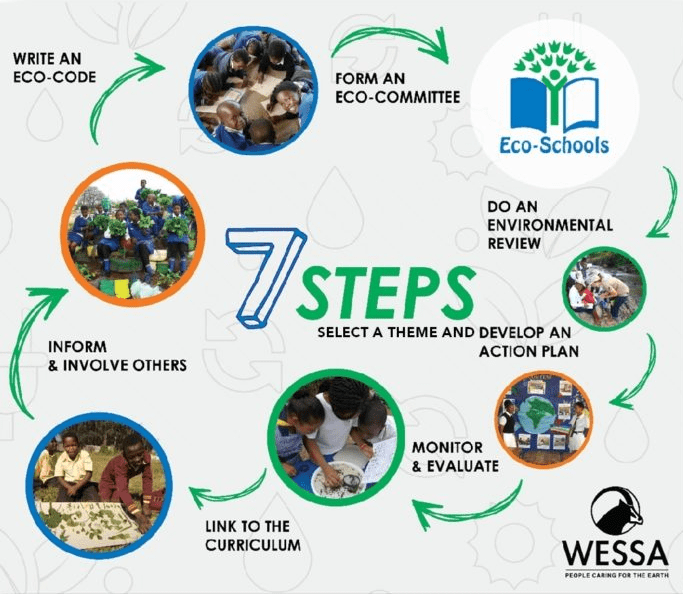Why Recycling at Schools Matters: Ideas for Teachers – eWASA
Gen Z and Gen Alpha (individuals born between 1997 and 2024) have gained a reputation as “woke” generations. That means they care more about climate change and social injustice than their forefathers did at their age. They are the youngest people on the planet and have a lot to lose when it comes to preserving the environment.
Why Recycling Should Start at School
While we may forget the details of our classroom lessons, the beliefs and behaviors we learn at school can stick with us forever. Teaching children about recycling from a young age can help them become environmentally conscious adults.
Young minds are built for learning, and children can typically pick up new skills much faster than their parents. It’s often easier to teach a child how to separate their recyclables than it is to convince an adult to do the same.
Older people have deep-rooted waste disposal habits that can be difficult to break. In adulthood, we need incentives to make positive change, especially when the consequences of our bad behaviors are invisible. It may be tough to find a reason to recycle, for example, when the smell of the landfill never reaches your home.
Conversely, we can inspire children to practice good habits voluntarily out of respect for the environment. This way, they are more willing to lead sustainable lifestyles when they grow up.
What the South African School Curriculum Teaches About Recycling
All South African schools (including IEB schools) follow Curriculum Assessment Policy Statements (CAPS) set out by the Department of Basic Education.
According to CAPS, the concept of recycling is first introduced in Grade R. It’s explored in more detail in Grade 3 when children learn about compost and how to recycle at home and school. The theme is reiterated through various art, science, and technology projects in grades 4 to 9.
By age 15, children should be familiar with recycling and preserving the environment. CAPS does a good job at teaching kids why sustainability matters, but it may fall short of inspiring lasting change. For this, many educators look to outside resources, such as WESSA Schools Programs.
Teaching Kids About Recycling: Ideas for Parents and Educators
Every parent or teacher knows that kids learn best when they’re having fun. There’s always room for creativity when it comes to children, and hands-on projects are often the most engaging. The following ideas are inspired by the work of WESSA Eco-Schools educators.
Competitions and Community Cleanups
Taking kids out of the classroom for a day gives them a welcome change of pace from everyday school life. Venturing out for a group cleanup also helps you spread the word about the good work your school is doing for the environment. You can even turn it into a game to make it more fun!
You might have teachers race against learners to collect the most rubbish, for example, or assign teams that collect different types of waste, encouraging kids to work together. Your school can also collect recycling to raise funds for charities like The Sweethearts Foundation.
Establishing an Eco Club
Earlier, we mentioned the importance of recycling willingly versus doing it for an incentive. Establishing an eco club as an extramural can help kids find friends with similar interests and build a community of young climate activists within your school.
Activities for eco clubs might include fundraising for environmental causes, making awareness posters, setting up recycling bins, going on nature walks, or planting trees at school. For younger kids, you might need a few teachers or parents to facilitate the fun.
Recycled Art Projects
Most children love art because it’s messy and colourful, and lets them unleash their imagination. The CAPS curriculum requires creative instruction from Grades R to 9, so there’s plenty of opportunity to play with recycled materials.
Paper mâché, sculpture, and college are some obvious choices, but you can also use recycling to explore traditional crafts that teach kids about their cultural heritage. For example, weaving baskets from plastic bags, crafting with recycled paper beads, or making musical instruments from used packaging.
Classroom Gardens and Insect Hotels
Gardening can teach kids that recycling is part of nature. They’ll learn how rotting food breaks down in the soil to nourish the plants and how water travels from the sky, into the ground, and back up again. Starting a veggie garden is also a way to ensure underprivileged kids at your school get enough healthy food to eat.
To teach learners about biodiversity (part of the Natural Science curriculum) consider growing indigenous plants, starting bee-friendly gardens, or building an insect hotel. To round things off, use recycled planters like old tyres, coffee tins, or cold drink bottles.
Become an Official Eco-School With WESSA
The Wildlife and Environment Society of South Africa (WESSA) launched the first SA Eco-School in 2003. It’s an international program currently active in 68 countries. Eco-Schools help children develop a deep respect and admiration for the environment through action-based learning. WESSA also provides teacher training and resources to help with lesson planning and assessment.
Register as an Eco-School here or get in touch with WESSA for more information. Businesses that want to sponsor an Eco-School or run a community project can contact eWASA for more information.
SOURCES:
- WESSA projects: https://mailchi.mp/1968fde884d8/march-2024-impact-snippets-wessa-programmes-and-projects-16191487?e=af27433467
- recycling rates remain low among school-leavers: https://www.researchgate.net/publication/351618962_Recycling_behavior_of_students_at_a_tertiary_institution_in_South_Africa


